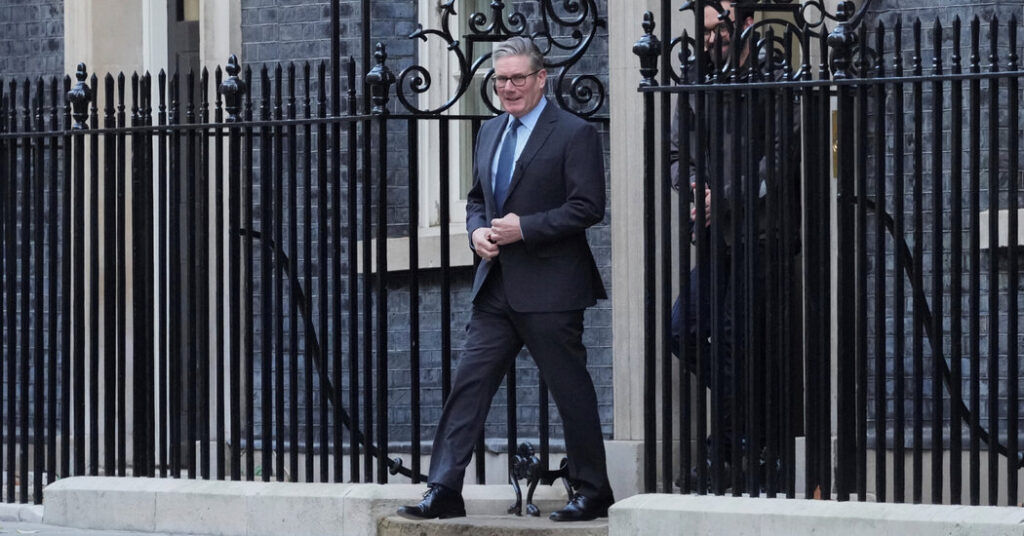Prime Minister Keir Starmer hopes Britain’s restrictive new policy on asylum seekers will give him a grip on a feverish immigration debate that is threatening his government. But the harsh new rules are already eliciting charges of “performative cruelty,” not least from lawmakers in his own Labour Party.
That is only the beginning of the challenges that will confront Mr. Starmer. He is pitching a policy that will deny refugees the ability to settle permanently in Britain until they have been in the country for 20 years — up from the current five years — and subject them to regular reviews, after which they can be forced to return to their home countries if those counties are once again deemed safe.
Britain is emulating Denmark, which has set out to make the lives of refugees as uncomfortable as possible to deter others from following them. Immigration experts have labeled this approach, parts of which have been tried by other Scandinavian countries, “negative nation branding.”
Whether going negative, however, will cause the number of arrivals to Britain to fall as it did in Denmark is an open question. Moreover, experts say, the policy could have a corrosive long-term effect on legal immigrants, who often feel targeted by the government’s hostile messaging.
In Denmark, said Kristina Bakkaer Simonsen, an expert on immigration at the University of Aarhus, “immigrants have lower levels of political trust and democratic satisfaction,” adding, “This is particularly pronounced among Muslim immigrants and those with less education.”
Professor Simonsen said it was hard to pinpoint how much of the drop in Denmark’s asylum claims was because of its policies. After a spike in 2015, fueled by wars in Syria, Afghanistan and Iraq, asylum claims fell across Europe. But Denmark’s share of claims also shrank relative to its neighbors.
The Danish government’s cutback of welfare benefits to asylum seekers played a part in that decline, she said. But it also led to more refugees living in poverty, which contributed to an increase in crime and poorer results in education.
Critics said the proposals would carry the same risks for Britain, which has already evolved from being one of the most liberal countries in Europe toward asylum seekers — approving 76 percent of claims in 2022 — to the middle of the pack, approving 48 percent in the first half of 2024.
“Plans to leave refugees in a state of perpetual uncertainty about where and if they can rebuild their lives are not just performative cruelty, they are counterproductive to integration and the economy,” Stella Creasy, a Labour member of Parliament, posted on social media on Monday.
Critics took particular umbrage at what one minister said was a plan to confiscate valuables, including jewelry, from arriving asylum seekers to help defray the cost of housing and feeding them. The government later clarified that it would not seize jewelry or goods with sentimental value at the border.
“The jewelry proposal is performative cruelty with terrible historical resonances for those who benefited from sanctuary in Britain,” said Sunder Katwala, director of British Future, a research organization in London, referring to those who fled the Holocaust during World War II. Mr. Katwala said he understood “the pressure to show control, but it must be control with compassion.”
Presenting the plan in Parliament on Monday, the home secretary, Shabana Mahmood, alluded to riots that have broken out at hotels housing asylum seekers in the past year. Overhauling the system, she said, was critical to averting further social unrest.
“To the British public, the system feels out of control and unfair,” Ms. Mahmood said. “To maintain the generosity that allows us to provide sanctuary, we must establish order and control.”
The government hopes the plan will help Britain curb the flow of asylum seekers who cross the English Channel in often unseaworthy boats. Nearly 40,000 people have made such hazardous crossings so far this year, more than in the same period last year, though behind the record-setting pace in 2022.
With its outmoded policies toward asylum seekers, Ms. Mahmood said, Britain had fallen behind other European countries in controlling the influx of these migrants. In 2024, she said, asylum claims in Britain increased by 18 percent, a record level; across Europe, they fell by 13 percent.
Under the new proposals, people granted asylum would receive 30 months of residency, after which their claims would be reassessed and they would face deportation if they were no longer “considered in need of protection.” If their home countries were judged to be safe, they would be returned on a fast-track basis.
Under the current policy, asylum claims are decided only once and refugees are granted permission to remain in Britain for five years, after which they can apply for permanent settlement. Refugees in the new system would be eligible for permanent settlement only after 20 years.
Britain said it would stop issuing visas to countries that do not cooperate in taking back refugees. Officials singled out Angola, Namibia and the Democratic Republic of Congo as potential targets for that penalty.
The government will also reduce benefits to asylum seekers, encouraging them to find work or otherwise pay for their own accommodation. And the government will remove a legal obligation to provide support to all asylum seekers who would otherwise be destitute.
“The challenge governments face is that they have a conflict between two goals,” said Madeleine Sumption, the director of the Migration Observatory at the University of Oxford. “They want to reduce the number of refugees. But if people are realistically going to spend the rest of their lives in the country, they want them to integrate.”
“The same set of policies that are used to deter people from coming are also policies that make it harder for them to integrate,” she said.
Much about the plan remained unclear on Monday. Officials said they did not have estimates for how the new rules would affect small-boat crossings, asylum claims or wider immigration numbers.
Politics, as much as policy, is driving the plan. Mr. Starmer is desperate to fend off pressure from the right, particularly the anti-immigration party Reform U.K., which has amassed a double-digit lead over Labour in the polls, in part because of its exploitation of anxieties about uncontrolled immigration.
But the qualms expressed by Labour lawmakers should be a warning to the government, according to political analysts. Mr. Starmer has been forced to back down on previous proposals, like a cutback in welfare benefits, after they provoked a backlash in his party.
The government, they said, could find itself in the unenviable situation where it antagonizes its supporters without winning favor from the anti-immigration right.
“We seem to be in a kind of doom loop where they make some bombastic declaration that gets picked up by the tabloids and alarms their base,” said Robert Ford, a professor of politics at the University of Manchester. “Then they row back and pretend, ‘That’s not what we meant at all.’”
Lizzie Dearden contributed reporting.
Mark Landler is the London bureau chief of The Times, covering the United Kingdom, as well as American foreign policy in Europe, Asia and the Middle East. He has been a journalist for more than three decades.
The post Why Britain Is Embracing ‘Negative Nation Branding’ appeared first on New York Times.




